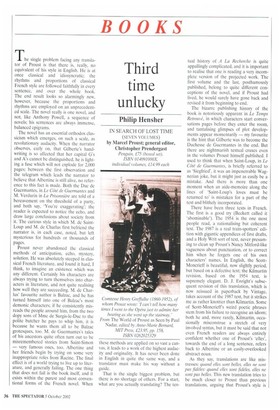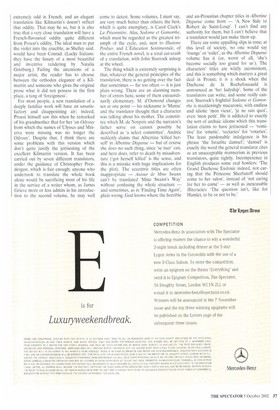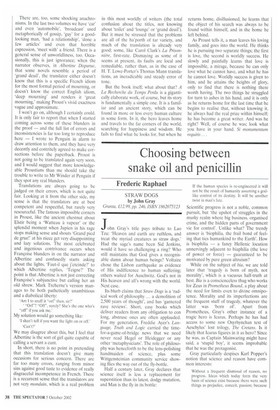Third time unluc
Philip Hensher
IN SEARCH OF LOST TIME
(SEVEN VOLUMES) by Marcel Proust; general editor, Christopher Prendergast Penguin, 175 (boxed set), ISBN 014091000X, individual volumes, £14.99 each
The single problem facing any translator of Proust is that there is, really, no equivalent of his style in English. He is at once classical and idiosyncratic; the rhythms and proportions of classical French style are followed faithfully in every sentence, and over the whole book. The end result looks so alarmingly new, however, because the proportions and rhythms are employed on an unprecedented scale. The novel really is one novel, and not, like Anthony Powell, a sequence of novels; his sentences are always immense, balanced epigrams.
The novel has an essential orthodox classicism which emerges, on such a scale, as revolutionary audacity. When the narrator observes, early on, that Gilberte's handwriting is so affected that her capital G's and A's cannot be distinguished, he is lighting a fuse which will not explode for 2,000 pages; between the first observation and the telegram which leads the narrator to believe that Albertine is still alive, no reference to this fact is made. Both the Due de Guermantes, in Le Cote de Guermantes and M. Verdurin in La Prisonniere are told of a bereavement on the threshold of a party, and both say, 'You're exaggerating'; the reader is expected to notice the echo, and draw large conclusions about society from it. The curious style in which M. de SaintLoup and M. de Charlus first befriend the narrator is, in each case, noted, but left mysterious for hundreds or thousands of pages.
Proust never abandoned the classical methods of anticipation, echo, mystery. solution. He was absolutely steeped in classical French literature, and found it hard, I think, to imagine an existence which was any different. Certainly his characters are always trying to turn themselves into characters in literature, and not quite realising how well they are succeeding. M. de Charlus' favourite author is Balzac, and he has turned himself into one of Balzac's most demonic characters; if he consistently misreads the people around him, from the two dopy sons of Mme de Surgis-le-Duc to the polite butcher he pays to whip him, it is because he wants them all to be Balzac grotesques, too. M. de Guermantes's tales of his ancestors quite often turn out to be misremembered stories from Saint-Simon — very famous ones, too. Albertine and her friends begin by trying on some very inappropriate roles from Racine. The final effect is of a world trying to live up to literature, and generally failing. The one thing that does not fail is the book itself, and it exists within the purest and most conventional forms of the French novel. When these methods are applied on so vast a canvas, it leads to a work of the highest audacity and originality. It has never been done in English in quite the same way, and a translator must make his way without a guide.
That is the single biggest problem, but there is no shortage of others. For a start, what are you actually translating? The tex
tual history of A La Recherche is quite appallingly complicated, and it is important to realise that one is reading a very incomplete version of the projected work. The first volume and the last, posthumously published, belong to quite different conceptions of the novel, and if Proust had lived, he would surely have gone back and revised it from beginning to end.
The bizarre publishing history of the book is notoriously apparent in Le Temps Retrouve, in which characters start conversations pages before they enter the room, and tantalising glimpses of plot developments appear momentarily — my favourite is the hint that Gilberte was to become the Duchesse de Guermantes in the end. But there are nightmarish textual cruxes even in the volumes Proust himself published. I used to think that when Saint-Loup, in Le Cate de Guermantes, is briefly referred to as 'Siegfried', it was an impenetrable Wagnerian joke, but it might just as easily be a mistake. And there is more than one moment when an aide-memoire along the lines of Saint-Loup's loves must be returned to' is mistaken for a part of the text and blithely incorporated.
There have been three texts in French. The first is a good try (Beckett called it 'abominable'). The 1954 is the one most people read, a rationalising but coherent text. The 1987 is a real train-spotters' edition with gigantic appendices of first drafts, and a Holy Writ sort of text, never presuming to clean up Proust's Nancy Mitford-like vagueness about punctuation, or to correct him when he forgets one of his own characters' names. In English, the ScottMoncrieff is beautiful, now slightly period, but based on a defective text; the Kilmartin revision, based on the 1954 text, is supremely elegant. D. J. Enright's subsequent revision of this translation, which is now reissued in paperback by Vintage, takes account of the 1987 text, but it strikes me as rather knottier than Kilmartin. Some of Scott-Moncrieffs weird poetic phrases stem from his failure to recognise an idiom; both he and, more rarely, Kilmartin, occasionally misconstrue a stretch of very involved syntax, but it must be said that not even French readers are always entirely confident whether one of Proust's 'elles', towards the end of a long sentence, refers back to Albertine or an easily-overlooked abstract noun.
As they say, translations are like mistresses: quand elks sont belles, elks ne sont pas fideles: quand elks sont fideles, elles ne sont pas belles. This new translation tries to be much closer to Proust than previous translations, arguing that Proust's style is
extremely odd in French, and an elegant translation like Kilmartin's doesn't reflect that oddity. That may be so, but it is also true that a very close translation will have a French-flavoured oddity quite different from Proust's oddity. The ideal man to put the violet into the crucible, as Shelley said, would have been Conrad. (Lucky Italians: they have the luxury of a most beautiful and inventive rendering by Natalia Ginzburg.) Failing the attentions of a major artist, the reader has to choose between the orthodox elegance of a Kilmartin and someone who gives the original prose what it did not possess in the first place, a tang of 'foreignness'.
For most people, a new translation of a deeply familiar work will have an unsatisfactory and disappointing air; indeed, Proust himself saw this when he remarked of his grandmother that for her 'an Odyssey from which the names of Ulysses and Minerva were missing was no longer the Odyssey'. Despite that, I think there are some problems with this version which don't quite justify the jettisoning of the excellent Kilmartin version. It has been carried out by seven different translators, under the guidance of Christopher Prendergast, which is fair enough; anyone who undertook to translate the whole book alone would be sacrificing most of his life in the service of a writer whom, as James Grieve more or less admits in his introduction to the second volume, he may well
come to detest. Some volumes, I must say, are very much better than others; the best, which is quite exemplary, is Carol Clark's La Prisonniere. Alas, Sodome et Gomon-he, which must be regarded as the greatest triumph of the cycle, and, next to Illusions Perdues and L'Education Sentimentale, of the entire French novel, is a total car-crash of a translation, with John Sturrock asleep at the wheel.
The thing which is extremely surprising is that, whatever the general principles of the translation, there is no getting over the fact that sometimes — far too often — it is just plain wrong. There are an alarming number of errors here, some of them extraordinarily elementary. M. d'Osmond changes sex at one point — his nickname is 'Mama' and the translator thought that a character was talking about his mother. The committee which M. de Norpois and the narrator's father serve on cannot possibly be described as 'a select committee'. Andree suddenly claims that Albertine 'killed herself' in Albertine Disparue — but of course she does no such thing, since se tuer' can, and here does, refer to death by misadventure ('got herself killed' is the sense, and this is a mistake with huge implications for the plot). The eccentric titles are often inappropriate — Autour de Mme Swann can't be translated 'Mme Swann's Way' without confusing the whole structure — and sometimes, as in 'Finding Time Again', plain wrong. God knows where the horrible and un-Proustian chapter titles in Albertine Dispante come from — 'A New Side to Robert de Saint-Loup'. I can't find any authority for them, but I can't believe that a translator would just make them up.
There are some appalling slips in tone; at this level of society, no one would say `lounge' or `toilet', as the Albertine Disparue volume has it (or, worst of all, 'she's become socially too grand for us'). The characters' titles are wildly inconsistent, and this is something which matters a great deal in Proust; it is a shock when the Duchesse de la Rochefoucauld is announced as ter ladyship'. Some of the translators can write, and some really cannot. Sturrock's frightful Sodome et Gomorrhe is maddeningly macaronic, with endless and idiotic `mon vieux', ne sais quoi', even 'moo petit'. He is addicted to exactly the sort of archaic idioms which this translation claims to have jettisoned — `vomitive' for 'emetic', 'sectaries' for 'votaries'. The least pardonable indulgence is his phrase 'the Israelite damsel'; 'damsel' is exactly the word the general translator cites as an unacceptable mannerism in previous translators, quite rightly. Incompetence in English produces some real howlers: `The Grand Duchesse Eudoxie indeed, not caring that the Princesse Sherbatoff should come to her salon', instead of 'not caring for her to come' — as well as inexcusable illiteracies; 'The question isn't, like for Hamlet, to be or not to be.' There are, too, some shocking anachronisms. In the last two volumes we have 'car' and even 'automobile', 'broadcast' used metaphorically of gossip, 'guy' for a goodlooking man, tad a relationship', 'done a few articles' and even that horrible expression, 'meet with' a friend. There is a general sense of unworldliness, too. Occasionally, this is just ignorance; when the narrator observes, in Albertine Disparue, that some novels resemble a period of 'grand deuil', the translator either doesn't know that this is a specific French idiom for the most formal period of mourning, or doesn't know the correct English idiom, 'deep mourning' and renders it 'great mourning,' making Proust's vivid exactness vague and approximate.
I won't go on, although I certainly could. It is only fair to report that when I started coming across some of these blunders in the proof — and the full list of errors and inconsistencies is far too long to reproduce here — I wrote to Penguin in alarm to draw attention to them, and they have very decently and contritely agreed to make corrections before the paperback. Proust is not going to be translated again very soon, and I would suggest that more knowledgeable Proustians than me should take the trouble to write to Mr Winder at Penguin if they spot any real blunders.
Translations are always going to be judged on their errors, which is not quite fair. Looking at it from the other side, my sense is that the translators are at best competent and respectful, but rarely very resourceful. The famous impossible corners in Proust, like the ancient chestnut about Elstir being a 'Watteau a vapeur' or the splendid moment when Jupien in his rage stops making sense and shouts 'Grand pied de gruel' at his niece get very disappointing and lazy solutions. The most celebrated and ingenious contrivance occurs when Francoise blunders in on the narrator and Albertine and confusedly starts asking about the lights, que j'eteinde?' to which Albertine replies, `Teigne?' The point is that Albertine is not just correcting Francoise's subjunctive but calling her an old shrew. Mark Treherne's version manages to be both pathetically unambitious and a diabolical liberty:
'Am Ito snuff it -orf' then, sir?'
"Orf '? "Off", surely? She's the one who's "off' if you ask me.'
My solution would go something like:
'I shan't tell if you want the light on or off.' `Can't?'
We may disagree about this, but I feel that Albertine is the sort of girl quite capable of calling a servant a cunt.
In short, there is no point in pretending that this translation doesn't give many occasions for serious concern. There are far too many errors, ranging from minor sins against good taste to evidence of really disgraceful incompetence in French. There is a recurrent sense that the translators are not very mondain, which is a real problem in this most worldly of writers (the total confusion about the titles, not knowing about 'toilet' and 'lounge' or 'grand deuil'). But it must be stressed that the problems are all of the ha'porth of tar variety, and much of the translation is already very good: some, like Carol Clark's La PrisonMere, first-rate. Dismaying as some of it seems at present, its faults are local and remediable, rather than, as in the case of H. T. Lowe-Porter's Thomas Mann translations, an ineradicable and steady error of tone.
But the book itself; what about that? A La Recherche du Temps Perdu is a gigantically elaborate work, of course, but its story is fundamentally a simple one. It is a familiar and an ancient story, which can be found in more or less every human culture in some form. In it, the hero leaves home and travels to the far corners of the world, searching for happiness and wisdom. He fails to find what he looks for, but when he returns home, disillusioned, he learns that the object of his search was always to be found within himself, and in the home he left behind.
As Proust tells it, a man leaves his loving family, and goes into the world. He thinks he is pursuing two separate things; the first is love, the second is worldly success. He slowly and painfully learns that love is impossible, a mirage, because he can only love what he cannot have, and what he has he cannot love. Worldly success is given to him, and he attains the heights of glory, only to find that there is nothing there worth having. The two things he struggled for turn to ashes in his hand, and it is only as he returns home for the last time that he begins to realise that, without knowing it, he always had the real prize within himself; he has become a great writer. And was he right? Well, of course he was; look what you have in your hand. Si monumentum requiris






































































 Previous page
Previous page